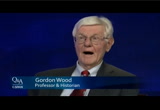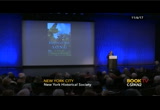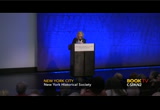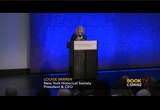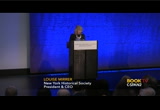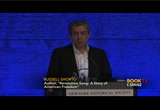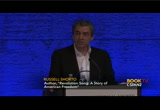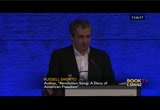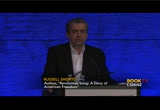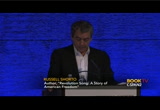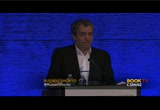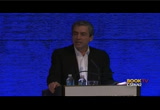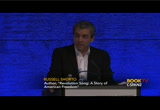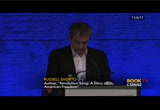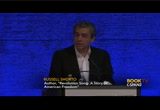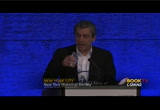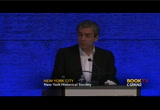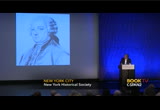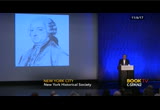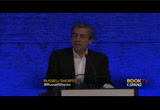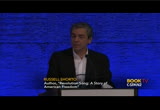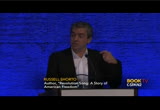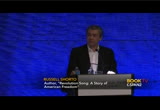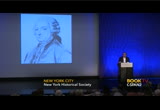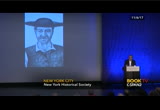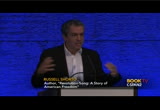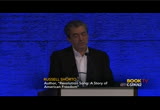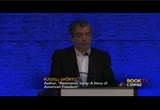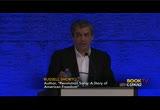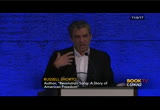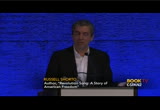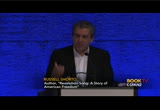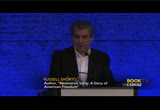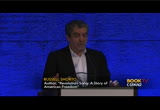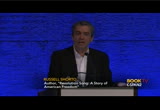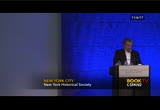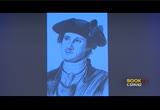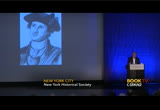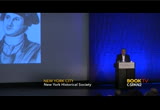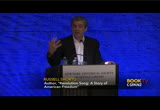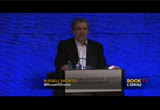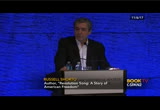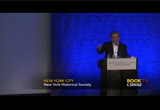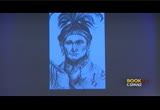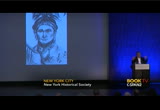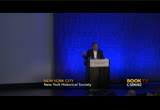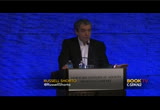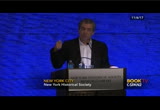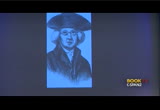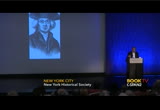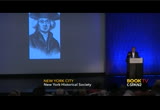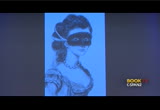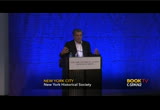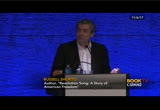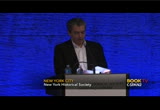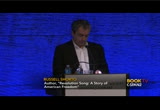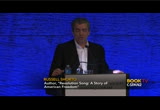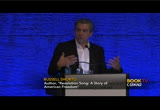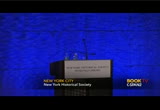tv Russell Shorto Revolution Song CSPAN December 17, 2017 3:00pm-4:01pm EST
3:00 pm
we had some depth in history and in law that jefferson didn't happen. not because jefferson couldn't. he just wasn't as interested in law as adam. >> tonight on c-span's q&a, professor and historian gordon wood on his book friends divided about the relationship and differing political views of john adams and thomas jefferson. .. different environments that is why education is so important to our attachment to us americans.
3:01 pm
tonight at eight eastern on c-span. [indiscernible] good evening everyone and welcome to the new york historical society. i am thrilled to welcome all of you to our beautiful auditorium. this evening's program is presented in conjunction with our new exhibition revolution to independence which will be on view in our galleries through march 11. i know that some of you have already you enjoyed a preview this evening. we invite you to join us as our guest following the program upstairs exhibition
3:02 pm
viewing will continue along with an open bar. tonight's program revolution sound. it is part of our eileen schwartz distinguished speakers series. it's a heart at the heart of our public programs. it has enabled us so many prominent authors and historians. i would also like to recognize and think a number of trustees that are with us. i like to think p.m. for her great partnership. thank you pam. i would also like to thank and recognize mister richard reese.
3:03 pm
and to think them as well for all that they do. you will hear from my great colleague. our vice president for public programs at the close of this event. tonight's program will last about an hour and it will include a question and answer session. it will be conducted via written note cards. if not my colleagues are going up and down the aisles and it will be happy to provide you with one. staff members will use the notecards later on in the program. the new book will be available for sale in our ny history store. we are really thrilled to welcome him back to the new york historical society.
3:04 pm
as well as contributing writer at the new york times magazine. they had been published in 14 languages and they have won numerous awards. you may have seen the spectacular review of the book in yesterday's new york times book review short of achievement and revolution a remarkable one and indeed it is. so now just before i congratulate russell --dash mike russell and invite him to the stage i would only asked ask that you priest please make sure anything that makes a noise is switched off and now you join me in congratulating and welcoming russell to our stage.
3:05 pm
thank you very much. thank you all for being here i want to thank the new york historical society for hosting this event and i want to thank louise again for supporting my work through the years and really for being a wonderful custodian of new york history. those of you who aren't so familiar with this building that did not always look like this. the transformation began about 12 years ago. and i think louise started here and took over here about 12 years ago. new york is a place that likes to pave over its past. think you louise. i am also this is a launch event for the book which technically comes out tomorrow. i want to quickly roll through
3:06 pm
some opening credits and give out some other things. i want to thank the people i ww norton. i want to thank my agent and friend who has been with me lo these many years i want to thank my family particularly my daughter anna who is somewhere here who years ago i have this idea and i kind of floated at by her before he ever put a were done on paper it's a dangerous thing to do ten air an idea to soon. she was very enthusiastic about it when i talked about you are telling the story of america's founding pipe virtue of the lives of people from
3:07 pm
different walks of life and through the cracks so to speak you would get the larger story. it was enough to kind of move me to the next stage. i want to thank my wife pamela for putting up with all of this for reading over and over again. and for putting up with me. those of you who know me are applauding. i want to begin with a confession the american revolution never did it for me. and never moved me. they are interested in one or another era because it comes to life a life for them for whatever reason. the great dutch historian has sentenced at the beginning of a collection of essays that he
3:08 pm
wrote about the dutch golden age that always stays with me. we might as will begin with what is the wellspring of all historical inquiry. the past was once a living reality. and i think that is what has to work for you. it has to and if the do it for me. the 17th century. i became focused on the intellectual world and that led me eventually took wright the island of the world. in the colonies that stretched over this part of the seaboard.
3:09 pm
what appealed to me and what struck me at that time was the way ordinary europeans were focused on themselves in a new kind of way. the concept of individual changed you might say it started with people looking into telescopes and microscopes and coming up with a new motion of what knowledge is based on. what they saw did not comport with the received wisdom from the church in the king. is called the founder of modern philosophy because he put this together into a notion. and it was that knowledge derived not from a received wisdom but from what he called the mind in its good sense. so that every individual have this thing inside himself or herself called reason. and this was connected in some mysterious way to nature and
3:10 pm
the universe and that meant that this connection allowed people of any background to be able to experience the access to knowledge. they very quickly begin to formulate notions such as if that is the case then that must mean that all people are equally valuable. and from there as early as the 1640s they were saying things like that means they have to have just as much right to education as boys. they began that early in which people the only legitimate form of government was one in which every individual have an equal say in the government.
3:11 pm
precisely because of that. and probably because of that they spread like wildfire. he seated the wider enlightenment's of the coming century. as i moved through the decades from the time i had focused on. through the latest 16 hundreds. i sought from saw from that perspective coming at it from the other side the leaders of what would be this american rebellion taking what was really a broad movement that have been building for more than a hundred years and focusing it. particularly focusing and and taxation without representation. they were part of this larger wave and not wave engulfed not only the elites it was in the
3:12 pm
air. i was 18th century equivalent. and changed the way people thought of themselves in relation to other people. so men with powdered wigs were wielding their quill pens on soldiers were squaring off at yorktown and saratoga and here in manhattan other interactions were happening. husbands and wives or altering the way they related to each other. the whole idea of a classified some human beings as a property of the property of others was suddenly being questioned. it affected the weight different classes of society related to each other that is
3:13 pm
how subconsciously i think i came to the idea for this book. why does it matter to you i don't know that it does. my presumption was that there is energy in the story of the american revolution and the countries that has not been tapped. despite all of the thousands of books devoted to it there are new ways of understanding the founding. which may give us some insight into what we are today. i think that's part of the job of history. that said as i begin my work i insisted to myself that this would not tell you what the american revolution meant there are thousands of books that will tell you what it meant instead it would be about lives in it x essential inquiry. but which lives. there has been a debate in
3:14 pm
resolution area studies for decades now over the question of where the inspiration for the revolution came from. i came from the elite. that inspired them and they wrote them down. the other camp said no it came from the grassroots. in the ground-level movements. i'm not an academic history and i don't have a dog in that fight. i wanted this book to accompany's -- encompass both. going back to the centuries. everybody was involved in affected by this larger wave so what i was approaching was aiming at. it was the nation's founding that would reflect both today where that and who we are now.
3:15 pm
so then, i have this idea i would write about the revolution from the perspective of people from different walks of life. by definition they have to come from a variety of backgrounds. they also had to be while documented lives. they have to fascinate me. and the head to fit together somehow which is harder than you might think. they felt together.
3:16 pm
they fell into place. i began writing we just started reading it for a couple of months i read and reread it. it eventually occurred to me this is my sixth book. you think i would've learned this by now. a book has to be about something. it can't just be about people going about their lives. and as i looked at it. it was about something it was about freedom. the most commonplace thing that a book about the american resident -- resolution be about. it would be about the broader stream coming out of the 17th century and affecting people on this continent.
3:17 pm
we will talk you through the sixth lives. it occurred to me what i was doing was mediating i thought it would be interesting for myself if nothing else to get a sense of how they would be mediated visually through one consciousness. i talked to my sister who happens to be an artist. she lives in new york. and she obliged me. she created six portraits and what i thought might be. i will show you each of the portraits as i talk about them. four of them are based on portraits from their time. the other two we don't have a portrait.
3:18 pm
those were composites. i am mixing in the book a couple of the people. some sense of the elite because they were part of the picture. as well as other levels of society. george jermaine this is a portrait done in about 7064. an ancient family aristocratic family. to give you an idea of his life and his upbringing he was brought up in a house called no house. in southeast inland. you can visit it and it is still technically owned by the family.
3:19 pm
it was part of this fat among the wealthy at the time was called a calendar house. fifty-two interior cases. it had seven interior courtyard. in 365 rooms. this is where he ran around and played when he was a child. his father the duke of dorsett was a diplomat and when he went off to ireland to be the lord lieutenant of ireland young george went with him. i think he learned you learned firsthand what it was like to be an englishman administering an empire.
3:20 pm
i kinda have the idea that he embodied it. it's fetal essence in the sense of what england was in its empire he took on and it became part of his personality. his father the lord lieutenant of ireland whose job it was to administer this. was a mild man young george from very early in life was domineering, combative, aggressive. he served as his father's secretary while he was there. and he saw the irish basically running circles around him. they were allowed a measure of the self -- self rule. they were getting away with murder. he eventually in time took over some of the tasks from
3:21 pm
his father. in doing so he got the administration there and a lot of hot water. and his father eventually resigned in disgrace what he thought was exactly what should be done. you should get on with it. you should not let them run around you. so he was lionized and he began to rise. at the same time he became a military man and he distinguished himself in battle. in time people started talking about him as a future prime minister. then it all comes crashing down. in 1759 in europe in the seven years war at a place called minden. there was one of the great european battles going on and he was leading the calvary.
3:22 pm
he was the second in charge of this. this is at a crucial moment when a decisive victory would probably force france to declare defeat. he is with the calvary up on the hill. he does not charge. a second one comes up. he doesn't charge. finally a third one comes up and says you have to charge england did win the battle. it was not the route that they had hoped for. he became the most hated man in england he insisted on corporate court-martial to clear himself. he was almost executed for treason.
3:23 pm
he lost all of his privileges but being in this year he began working his way back up the rungs of power. he was given the job of under secretary of state for the american colonies. right at the time obviously when the american colonies were becoming a big deal and when the work breaks out then is the one has to administer it. as he does so both his supporters and his enemies acknowledge that he is doing it out of a sense of redemption. they call him the cowher of minden. one thing that attracted me to
3:24 pm
him. he is just the perfect character chair that the americans created at the funeral backward monarchy and aristocracy while we are advancing the cause of liberty and freedom. the other nice thing about focusing on this. that was one side. it was only one side of what was going on. all of the rhetoric they are taking their using our indictment against us. in fact historically speaking were on the wrong side of this. you have that battle being raged this is one of the composite portraits.
3:25 pm
this is venture smith. leslie who freed himself. the artist worked from we don't know for sure. he surmises that in africa where he was known there. he was a member of the lonnie tribe and said the basis for this portrait was a lonnie mask and then the clothing of a new england farmer which is where he spent his life. when you are researching you want to get into the details and into the life of an african slave as i said before you want texture in material. there is a category called
3:26 pm
slave narrative anything okay great. i will just go through one of those and find one. as you go through them it becomes tricky because you notice in the sort of a sameness in them. many of them were channeled by abolitionist leaders who have the noble cause. they were trying to compile a list of stories to win people over for the need of abolition of slavery slavery late. -- slavery. it's kind of hard to get at the underlying story. it makes these slave narratives kind of problematic. one narrative which is often classified for obvious reasons. as the narrative of venture smith.
3:27 pm
it was not processed by anyone. it came from one person's life and mouth. he was born and raised in west africa in a village called duke and dara. it gives you a really rich sense of perspective. what i'm trying to do with this book here is the british show. here is the african intro. you're putting these puzzle pieces together and ultimately then you have the sense anyway kaleidoscopic sense of what it was at the time. he is a board in a cattle camp which is a where they have he
3:28 pm
was of the child of a local prince. they invaded the village. he was taken captive but not before witnessing the torture and killing of his father. he is taken with others to the coast of what is now ghana and there is another army. he is transferred to them. and it is a town where it was one of the towns where there was the slaves. he was held there. it happened that the ship that was in her at this time called the charming susanna was from newport rhode island.
3:29 pm
with 86 other slaves and he lucked out in one respect the ship was destined for barbados and they were all gonna work in the sugar fields there. he was about ten years old. he was strong and smart the steward of the ship have his eye on him. and he asked the captain if you could buy him for his own property. at the time in the 18th century the word venture was used for your personal property that you barter with. his venture was four for pieces of calico cloth. because he gave his venture for this boy he renamed tim
3:30 pm
venture. that's what he was known as. he avoids barbados is taken by ship to newport to spend some time there. working in a well-to-do house. learning things like the functioning of a new england household and learning the english language. he then gets sold to succession of different owners his teenage years are spent on fisher island in long island sound and then he moves to stonington connecticut across the sound from the coast. and as he grows he's very strong and very smart. and he develops as i was doing this book. i was looking for peoples who
3:31 pm
stories connected up. but then as i got further into it i noted other kinds of connections. one of them was on her culture. the 18th century honor codes. the honor code that he was raised with in africa was similar to the entire water virginia tobacco planter's son. part of the honor code told him. because they have a slavery where he was in africa that which ever site you happen to be on whether you are the owner or the slave there was a proper way to behave. once he became a slave he seems to accepted there was a right way to do it. i will expect certain things from people on the other side of this how many times owners did not uphold that side of the organ. he becomes bitter about that. so then he we are in the.
3:32 pm
where the american colonies and white people we have the stamp act and the towns and duties. the systematic sequence of events in which white americans are becoming more and more disgruntled with england and talking more more about freedom. while that is happening he decides he is going to start buying and saving money by himself out of slavery. it's a very rare thing to do. the last change of owners he has enough stature that he actually interviews several prospective owners to figure out which one he wants to go with. and a man named oliver smith who was a wealthy businessman agreed with him in advance that if he bought him he would eventually get him the opportunity to buy himself out of slavery.
3:33 pm
he goes with oliver smith. he has a wife and children by this time. and he allows him to buy himself and his family out of slavery. he does this systematically. everything about it. he was a transactional figure. when he talks about his daughter getting sick. he said the dr. visit cost me 40 pounds. when it comes to buying people out of slavery then later his wife and daughter. he knows that his sons can work and raise money faster and then they can get the wife and daughter out. and what struck me as well all of this is going on the american revolution is coming to a head and there were lots
3:34 pm
of people in the colonies including people who were at george washington's side who thought they were fighting for freedom for everyone. and that when they wanted they would free the slaves and it would really mean something this new freedom. they seem not to have believed that. he went about taking matters into his own hands. he buys everyone out of slavery. he takes on his last owner's name which may seem like a strange thing to do but it was actually practical. he was a very practical guy. and being a freed slave was a very dicey proposition. everyone knew what it was. being a freed slave you are in a no man's land. cities all around the country passed laws preventing them from settling. if they become destitute the town has to take them on.
3:35 pm
he gets away from the coast where the word is more evident. he begins buying land there. and that in itself is unusual thing. it is more than most white new englanders at the time who are wealthy owned. it's a tricky thing to do but it was a necessary thing because he's trying to make it his way. tip to make people take notice of them. and it's a doubly difficult thing to do. this is before mortgages were common. you have to rely on your neighbors so in the land records i would find a document in which venture smith is buying this many acres of land and their two or
3:36 pm
three other names on the document. and these are neighbors of his who agreed to put up money. they're kind of cosigning for the loan. so venture smith does this throughout the. of the revolution and into the early. of the american republic and he dies as a successful land owner in that part of connecticut and not only that he has this estate and as he becomes more comfortable he begins to bring other freed africans on his estate. and i make this comparison at one point between his its state and george washington's estate which have you visited those two he would've seen a functioning estate but the ones on the new england estate
3:37 pm
was freed blacks. i have to make sure that i'm not going over my time here. this portrait is based on the charles wilson peel portrait. this is george washington at the age of 40. he was the last of the people who i settled on for my book. in the very obviousness of him i do not want to choose him but that as soon as i did. i knew i wanted to have one founding father represented in it. for a while i thought maybe i will do hamilton because he doesn't get enough attention.
3:38 pm
i settled on washington and as soon as i did he's the one that connects them all. the one that interacts with most of all of these other figures. and then i'm telling you now the stories. in the book i wove these altogether. i am laying out each story. when i'm talking about venture smith or i'm talking about lord george jermaine. more in this other place where you don't associate with the american revolution. this is familiar territory. i'm hoping that as a reader moves through you have this touchstone. i was talking about honor codes is talking about parallels that come up as you are doing research and
3:39 pm
striking parallels i found between washington and venture smith to some extent washington was born in tidewater virginia. his father was a moderately successful venture. a lot has been written about her. this backwards figure. he was kind of mirroring down i think because she have a lot of property she have no teeth she smoked a pipe she didn't trust people. at about the same age that venture watched his father die george washington's father's died. this is kind of the life i will live. i'll get this education in
3:40 pm
england and then he's thwarted because when his father dies there's not enough money. his mother keeps him very close to her. so he stuck he has his honor code was his this is clearly the event in a situation that mightily influence the person he became. he lucked out when the brother married into the fairfax family which was the largest landholders in virginia and she became the protége of george fairfax who was the have of the family. and he seemed to see a lot of himself in the boy. he tried to give him the first step in life that he himself had head. washington's mother would not let him go.
3:41 pm
under fairfax tutelage washington read for example the galaxy worse. fairfax taught him to have a roman this edge and have a frosty don't show the world that what you're thinking. but it's fine to have bounding ambition. you see him trying very hard. to adopt the manners that go along with the honor and the status there is a document which you may be familiar with the rules of stability he got his hands on a hundred -year-old french etiquette manual at the age of 16 he
3:42 pm
copies out hundred and one rules of civility and how to behave in society. there are things like wooden dining in public in eating a pitted fruit do not spit the stone directly onto your plate spit into your hand and then when walking with a person of quality in conversing it is like painstakingly writing these out. and teaching themselves how to become a gentleman. i will go much further. like jermaine he thought the military as a way to gain honor. he was in the virginia militia and in the french and indian war which is the american theater of the seven years of work he gets a commission.
3:43 pm
they go to the forks of the ohio which is the place the french had settled with the mississippi river valley. the french begin to move eastward and they have to do something. washington was sent on the submission to basically warn the french to stay away from what was called the forks of the ohio. encounter this party of 35 french canadians in western pennsylvania and attack them. and massacred them. and this is the event that france was looking for. this is the event that set off the war. he really disgrace himself in the washington and it set off the work and then this becomes
3:44 pm
they were fighting this war against each other sort of across the ocean. i'm moving on. it is because the original is right behind where you are all sitting in the main hall here and hangs in the it hangs in the new york historical society. this is called corn planter by the english. i wanted to have the native. needless to say the native americans were aside. we have the six tribes.
3:45 pm
i wanted to represent that. in that perspective. corn planter is a fascinating figure to me everybody has the stereotypical notion of what the proud, vicious and where your was and he was that but he was the opposite of that as well. he was philosophical. he was a compromiser. a realist. a popular -- is always tricky in dealing with native americans because all of the records are processed through people who are not native americans. there are enough records to give this rich picture of this man. i think part of the ability to be nuanced a lineage matron.
3:46 pm
and they were a metro lineal people. his father was a judge -- dutch american. kind of a narrative who traveled through. and he was that result. he was an adult he commented that growing up other kids made fun of him because he was different than them. he was aware of this being other the father theme. they both lose at their father's early. they'd really had a father on the scene. a bothered him all through his life. and at least two times he makes a track hundreds of miles to try to reckon with this man. in the father basically wants nothing to do with them he's
3:47 pm
in the middle of fighting a war of fighting a battle in upstate new york. he recognizes this old man and it's his father. they get 10 miles down the trail. he's yelling at him at this point. don't recognize me. so patently wants this father to acknowledge him. you really since this texture. when the war breaks out. both sides want to see the confederacy out of it. for one thing they are scared of them. after the british lose a whole
3:48 pm
army. george jermaine who has his need to win tells as agents of the results of that is a council. in the corn planter gives the speech he's overruled. because he understands the majority rule. the fights along with them. attacking american villages and settlements and then after the war the british lose they appoint him to be the representative to deal with the americans. and now he has to deal with the american leaders and say how can we work this out. they basically say you lost.
3:49 pm
and history is rolling over you. he meets with them twice. this is at the end of his presidency and they are reinforced by that time to sell land and he's tried to get something out of it. and he says to washington all right, if we sell this land in the past we would sell land and we would just by thinks will you help me to put the money in the bank. is there a thing called interest. you see him working. please help me here is a truly complex figure alongside the americans in the british. abraham gates.
3:50 pm
they get a whole other perspective on times. and going back to what i was talking by the beginning about the 16th century in the broader current of freedom that the american resolution represents. a street level fighter. the ninth child of a black smith appeared he have to be apprenticed as a shoemaker. he was also half dutch. early on in life. he has a chip on his shoulder. it is the powerful dutch families he teaches himself the law at the time of the
3:51 pm
french and indian war. he begins writing legal briefs. what appeals to me about him also is he holds several different titles to offices in the battle for new york he is corresponding constantly with george washington after the war he stops and pivots because of what he sees as the american elite washington and madison becoming a homegrown version of what you have just fought against.
3:52 pm
with the colonies in the nations starts to move towards a constitution. he does not trust it. he is appalled by that. all the president has to do is get the senate on his side. and he can become a tyrant. history repeats it. they recommend an echo that is recommending pretty loudly these days. margaret munn creased as a second of these portraits that are not based on late because we do have a portrait of her from life.
3:53 pm
a daughter of a revolutionary officer she became a loyalist herself. as a teenager. she is altercations with a general washington when she is a 14-year-old girl and he is a general. what struck me it would be totally inaccurate to talk about women's freedom. there was the cutting edge of it. while the war was happening was writing newspaper articles. depicting the forced marriage is a wrong. that is exactly what happened to her. our father forced her to marry
3:54 pm
an abusive husband. she tried to rebel she could do it. she wants independence and there are only two paths open to her. being an actress or a mistress of a wealthy man. she becomes a serial mistress to a number of wealthy men in london and in paris. so while the airplane out in the aftermath everything that happened affected her and set her off on the trajectory of her life. the few historians that had written about her in the past assumed that she died in 1787. i was convinced that she did not. i have to find proof. and i found three letters that she wrote after that in the
3:55 pm
first one i found here is a go on with these talks i will get better at managing my time. i just want to say at the end here that i started starting with these these products to get as writing history. in the past year i came to feel that it was very relevant. the issues at stake back then are with us again. freedom of speech and religion. and the press. we seem to have it turn back the clock. what i think we are seen as evidence of the fat in the sense all of american history has been an effort to address that failure. once we are past this time i hope one positive result will be a renaissance in education and critical thinking.
3:56 pm
in a commitment to making a history part of the present. the people who fought for that. were conscious of living in a tradition of unfolding freedom that stretched back more than a century. thank you. [applause]. i had left a few minutes for questions. let me see. if you have to add a seventh or eight subject who would you choose and why. i really wanted to have at least two women in this. there are a number of women
3:57 pm
who wrote diaries who are not well-known at all. the reason i did not choose one of them is they were very small worlds and i can find a way to flush out that world enough to make it sort of fit at the same level with others. i would've liked to have that on the farm kind of experience. what do you think it was a civilian experience of the revolution in new york city. what happened to those who cannot evacuate. i focus on this when i talk about margaret. her story in new york they lived in new york. she and her family. the americans were in the early stages.
3:58 pm
with to get control of the new york city in the southern valley. because of events she is kind of stuck behind enemy lines in new york city with the american authors. with washington and the other authors. her father is with the british army on staten island as they are amassing forces. through her we get a sense of what new york is life as a civilian. it is really two places. there had been a lot of suffering building up to this point so there was a city of disease and despair but right beside it was a city of 20,000 or so troops in officers and the british officers created their own little universe where you could buy furniture and go to the theater and play
3:59 pm
4:00 pm
we have been exhibition, mapping america's road from revolution to independence. it's open on view until 8:15 tonight. and russell's books are signed in the museum store. please go there as well, pick up the new book, and thank you again and thank you all for coming. [applause] [inaudible discussion] [inaudible discussion]
44 Views
IN COLLECTIONS
CSPAN2 Television Archive
Television Archive  Television Archive News Search Service
Television Archive News Search Service 
Uploaded by TV Archive on

 Live Music Archive
Live Music Archive Librivox Free Audio
Librivox Free Audio Metropolitan Museum
Metropolitan Museum Cleveland Museum of Art
Cleveland Museum of Art Internet Arcade
Internet Arcade Console Living Room
Console Living Room Books to Borrow
Books to Borrow Open Library
Open Library TV News
TV News Understanding 9/11
Understanding 9/11